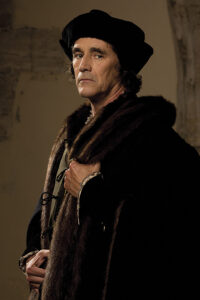 Hilary Mantel’s Wolf Hall trilogy transformed Thomas Cromwell into a literary sensation, offering a complex, humanized portrayal of a man often vilified by history. In Mantel’s hands, Cromwell emerges as a pragmatic survivor, a loving family man, and a brilliant political operator. But how does this fictionalized version compare to the historical Cromwell? Let’s delve into the contrasts and overlaps between the Cromwell of Wolf Hall and the man who served Henry VIII.
Hilary Mantel’s Wolf Hall trilogy transformed Thomas Cromwell into a literary sensation, offering a complex, humanized portrayal of a man often vilified by history. In Mantel’s hands, Cromwell emerges as a pragmatic survivor, a loving family man, and a brilliant political operator. But how does this fictionalized version compare to the historical Cromwell? Let’s delve into the contrasts and overlaps between the Cromwell of Wolf Hall and the man who served Henry VIII.
Cromwell’s Rise: Ruthless Opportunist or Shrewd Survivor?
In Wolf Hall, Cromwell’s ascent from the son of a Putney blacksmith to Henry VIII’s chief minister is depicted as a testament to his intelligence, adaptability, and loyalty. Mantel’s Cromwell is a self-made man whose early hardships in Europe forged his resilience and sharpened his instincts.
The historical Cromwell’s rise is no less remarkable. He leveraged his legal acumen, fluency in multiple languages, and international experience to carve a path through the treacherous Tudor court. While history records his cunning and ambition, Wolf Hall tempers this image by emphasizing his humanity and loyalty, particularly to Cardinal Wolsey. In reality, Cromwell’s loyalty to Wolsey might have been more calculated—he managed to weather Wolsey’s downfall and ingratiate himself with the king, a feat that required both pragmatism and guile.
A Family Man or a Cold Political Strategist?
Mantel’s Cromwell is deeply affected by the deaths of his wife and daughters, and their loss shapes his character. Scenes of him mourning his family lend him an emotional depth that contrasts with the ruthless minister often portrayed by historians.
While historical records suggest Cromwell was indeed devoted to his family, personal sentiments rarely feature in the dry annals of Tudor history. What is clear is that he used marriage alliances strategically, arranging advantageous unions for his son and nephew. This duality—a family man who also saw relationships as tools of power—is where the Wolf Hall Cromwell aligns most closely with his real counterpart.
Religion: Devout Reformer or Political Manipulator?
In Wolf Hall, Cromwell’s Protestant faith appears genuine, and he is portrayed as a man committed to reforming the Church of England for the betterment of society. Mantel’s Cromwell views the dissolution of the monasteries as necessary to redirect wealth toward a more just and equitable society.
The historical Cromwell’s religious motivations are harder to pin down. While he undoubtedly supported Protestant reforms and was instrumental in breaking from Rome, his actions were also deeply political. The dissolution of the monasteries enriched the Crown and bolstered royal authority, but it also enabled Cromwell to reward allies and consolidate his own power. Whether Cromwell’s faith was sincere or opportunistic remains a matter of debate.
Cromwell and Anne Boleyn: Protector or Schemer?
One of the most fascinating aspects of Wolf Hall is Cromwell’s nuanced relationship with Anne Boleyn. In Mantel’s telling, Cromwell initially supports Anne’s rise but later orchestrates her downfall when her ambitions clash with his master’s wishes. He is not portrayed as vindictive but as a man doing what is necessary to survive.
Historically, Cromwell’s role in Anne’s fall was pivotal. He masterminded her trial, gathering evidence (much of it dubious) to secure her conviction. While Mantel portrays this as a reluctant act of self-preservation, the real Cromwell may have seen it as a calculated move to eliminate a rival faction at court. His actions cemented his reputation as a ruthless political operator.
The Fall: Victim or Villain?
Mantel’s Cromwell is a tragic figure, undone not by his own failings but by the fickle whims of Henry VIII and the machinations of his enemies. His involvement in Henry’s disastrous marriage to Anne of Cleves is depicted as an honest mistake, and his execution feels both unjust and inevitable.
The historical Cromwell’s fall was indeed swift and brutal. Blamed for the Cleves marriage and undermined by his conservative enemies, Cromwell was accused of heresy and treason and executed in 1540. While his downfall highlights the dangers of serving a mercurial king, historians have noted that Cromwell’s accumulation of enemies and power plays contributed to his demise. Mantel’s version, while sympathetic, glosses over some of the more controversial aspects of Cromwell’s career, such as his role in orchestrating show trials and his opportunistic dealings.
Legacy: Reformist Hero or Machiavellian Manipulator?
Mantel’s *Wolf Hall* trilogy has profoundly influenced modern perceptions of Cromwell, recasting him as a sympathetic and relatable figure. The historical record paints a more ambiguous picture. Cromwell was undoubtedly a visionary reformer who modernized government and reshaped England’s religious landscape, but he was also a man willing to wield power ruthlessly to achieve his aims.
Conclusion
The Thomas Cromwell of Wolf Hall is a richly imagined character, brought to life with empathy and insight by Hilary Mantel. While the real Cromwell may lack some of the warmth and introspection of his fictional counterpart, he remains one of the most fascinating figures of the Tudor era—a man who rose from obscurity to reshape a nation and paid the ultimate price for his ambition.
Mantel’s work invites us to view Cromwell through a different lens, challenging us to consider the humanity behind the historical figure. Whether as a hero, a villain, or something in between, Thomas Cromwell’s legacy continues to captivate us.